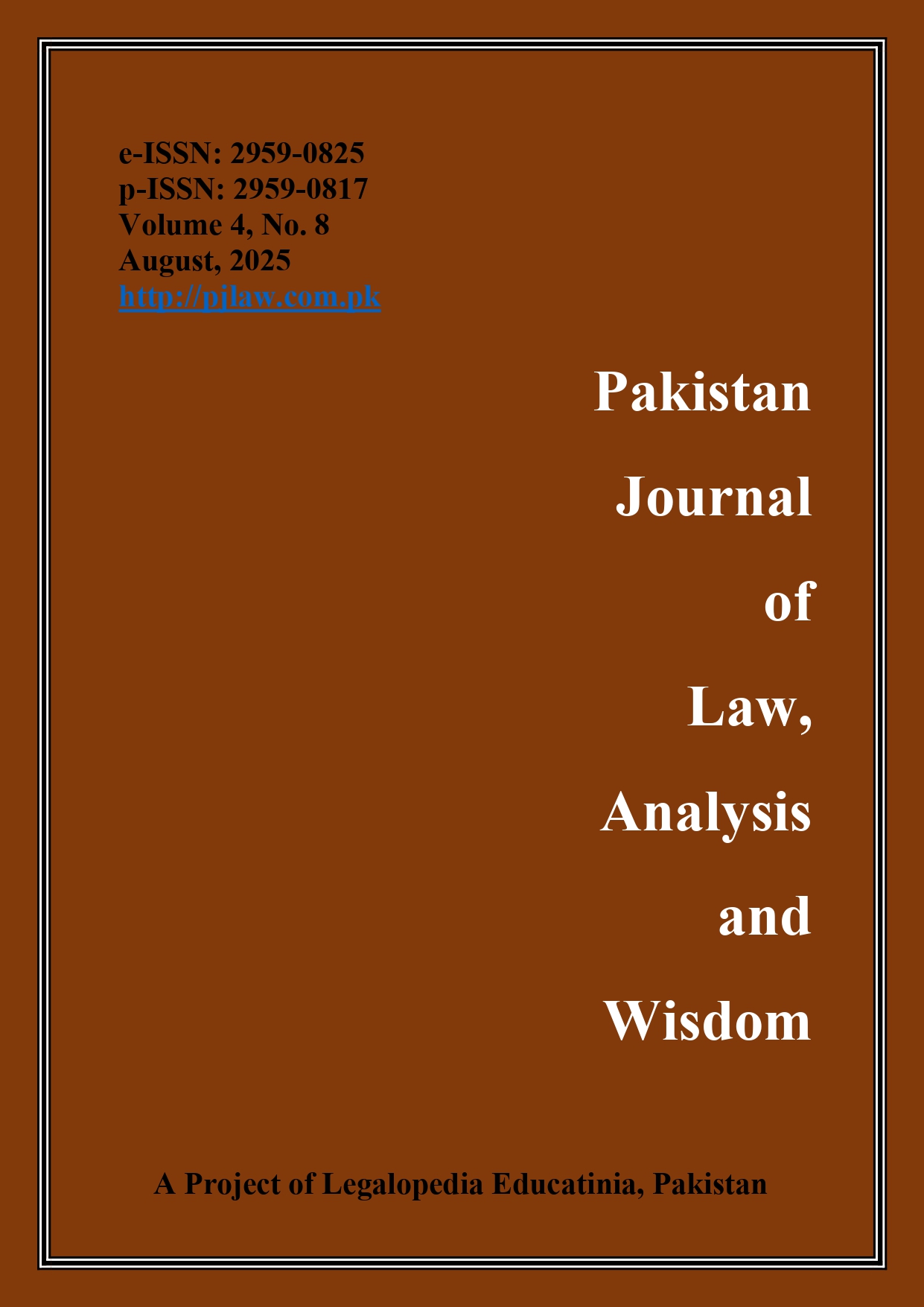Mediating Role of Self-Directed Learning in the Relationship Between Digital Skills and Creative Mindset among University Students
Keywords:
Digital skills; Self-Directed Learning; Creative Mindset; Higher Education; Mediation Analysis; Student AutonomyAbstract
This article examines how self-directed learning (SDL) functions as a mediator between digital skills and creative mindset among university students in Pakistan. Adopting a quantitative survey design, data were collected from 400 participants at the University of Sargodha using standardized instruments, including DigSki-CUS, the Self-Directed Learning Instrument (SDLI), and the Short Scale of Creative Self (SSCS). Analyses performed through SPSS (version 27) and Hayes’ PROCESS Macro (Model 4) demonstrated that digital skills significantly influenced both SDL and creative mindset, with SDL exerting a partial mediating effect. The study also revealed academic-level differences, with postgraduate students reporting stronger SDL than undergraduates, while no meaningful gender variations were observed. These findings highlight that digital skills and self-directed learning play a central role in fostering a creative mindset among university students. Aligned with the global agenda of Sustainable Development Goal 4 (Quality Education), the study provides valuable insights for educators, curriculum planners, and policymakers seeking to strengthen digital readiness and autonomous learning practices to enhance student innovation.
References
Ahmad, J., Mehdi, F.I., Cheema, M.F., Aftab, M. and Omer, Z., 2024. Comparing readiness for self-directed learning in undergraduates of private and public medical colleges. JPMA. The Journal of the Pakistan Medical Association, 74(11), pp.2035–2038. https://doi.org/10.47391/JPMA.11458
Alanoglu, M., Karabatak, S. and Yang, H., 2025. Understanding university students’ self-directed online learning in the context of emergency remote teaching: the role of online learning readiness and digital literacy. Journal of Computing in Higher Education, pp.1–27. https://doi.org/10.1007/s12528-025-09458-0
Chen, D., Zhang, Y., Luo, H., Li, J. and Lin, Y., 2023. From ICT utilization to student learning achievement: Mediation effects of digital literacy and problem-solving ability. In International Conference on Blended Learning (pp.71–82). Cham: Springer Nature Switzerland.
Fan, W. and Wang, M., 2022. Development and validation of the Digital Skills Questionnaire for University Students (DigSki-CUS). Education and Information Technologies, 27, pp.9443–9463. https://doi.org/10.3390/su14063539
He, W.J. and Chiang, T.W., 2024. From growth and fixed creative mindsets to creative thinking: an investigation of the mediating role of creativity motivation. Frontiers in Psychology, 15, p.1353271. https://doi.org/10.3389/fpsyg.2024.1353271
Igartua, J.J. and Hayes, A.F., 2021. Mediation, moderation, and conditional process analysis: Concepts, computations, and some common confusions. The Spanish Journal of Psychology, 24, p.e49. https://doi.org/10.1017/SJP.2021.46
Karwowski, M., Lebuda, I. and Wiśniewska, E., 2018. Measuring creative self-efficacy and creative personal identity. The International Journal of Creativity & Problem Solving, 28(1), pp.45–57.
Lateef, A., Noor, K. and Yousaf, S., 2025. Digital divide in education: Barriers to equitable access in Punjab, Pakistan. Journal of Social Signs Review, 3(2), pp.434–456. Available at: https://socialsignsreivew.com/index.php/12/article/view/199 [Accessed 18 August 2025].
Lee, D.C. and Chang, C.Y., 2025. Evaluating self-directed learning competencies in digital learning environments: A meta-analysis. Education and Information Technologies, 30(6), pp.6847–6868. https://doi.org/10.1007/s10639-024-13083-2
Liu, B., Wang, D., Wu, Y., Gui, W. and Luo, H., 2023. Effects of self-directed learning behaviors on creative performance in design education context. Thinking Skills and Creativity, 49, p.101347. https://doi.org/10.1016/j.tsc.2023.10134
Morris, T.H., 2019. Self-directed learning: A fundamental competence in a rapidly changing world. International Review of Education, 65(4), pp.633–653. https://doi.org/10.1007/s11159-019-09793-2
Papagiannis, P. and Pallaris, G., 2024. Evaluating 21st century skills development through makerspace workshops in computer science education. arXiv preprint arXiv:2411.05012. https://doi.org/10.48550/arXiv.2411.05012
Pepito, M.J.T. and Acledan, M.Y., 2022. Influence of digital literacy and self-directed learning in the online learning success of STEM college students. International Journal of Humanities Social Sciences and Education, 9(1), pp.88–100. https://doi.org/10.20431/2349-0381.0901007
Piaget, J., 1954. The construction of reality in the child. 1st ed. London: Routledge. https://doi.org/10.4324/9781315009650
Qian, J., Li, X., Liu, T., Zhang, M. and Li, K., 2023. Direct and indirect effects of self-directed learning on creativity in healthcare undergraduates: A chain mediation model of openness to challenge and diversity and creative self-efficacy. Frontiers in Psychology, 14, p.1182692. https://doi.org/10.3389/fpsyg.2023.1182692
Rafiq, S., Iqbal, S. and Afzal, A., 2024. The impact of digital tools and online learning platforms on higher education learning outcomes. Al-Mahdi Research Journal (MRJ), 5(4), pp.359–369. Available at: https://ojs.mrj.com.pk/index.php/MRJ/issue/view/14
Ryan, R.M. and Deci, E.L., 2020. Intrinsic and extrinsic motivation from a self-determination theory perspective: Definitions, theory, practices, and future directions. Contemporary Educational Psychology, 61, p.101860. https://doi.org/10.1016/j.cedpsych.2020.101860
Satar, M., Seedhouse, P., Kharrufa, A., Ganassin, S., Dooly, M., Pena, J.B. and Haznedar, B., 2025. Migrants’ digital skills development: Engaging with and creating digital cultural activities on the ENACT web app. ReCALL, 37(2), pp.191–214. https://doi.org/10.1017/s0958344024000351
Shafait, Z., Yuming, Z., Meyer, N. and Sroka, W., 2021. Emotional intelligence, knowledge management processes and creative performance: Modelling the mediating role of self-directed learning in higher education. Sustainability, 13(5), p.2933. https://doi.org/10.3390/su13052933
Shah, S.S., Shah, A.A., Memon, F., Kemal, A.A. and Soomro, A., 2021. Online learning during the COVID-19 pandemic: Applying the self-determination theory in the ‘new normal’. Revista de Psicodidáctica (English Edition), 26(2), pp.168–177. https://doi.org/10.1016/j.psicoe.2020.12.003
Shen, W.Q., Chen, H.L. and Hu, Y., 2014. The validity and reliability of the Self-Directed Learning Instrument (SDLI) in mainland Chinese nursing students. BMC Medical Education, 14(1), p.108. https://doi.org/10.1186/1472-6920-14-108
Tang, F., 2024. Understanding the role of digital immersive technology in educating the students of English language: Does it promote critical thinking and self-directed learning for achieving sustainability in education with the help of teamwork? BMC Psychology, 12(1), p.144.
Downloads
Published
Issue
Section
License
Copyright (c) 2025 Farkhanda Jabeen, Prof. Dr. Riffat-un-Nisa Awan, Dr. Muhammad Nadeem Anwar

This work is licensed under a Creative Commons Attribution-NonCommercial 4.0 International License.











 LEGALOPEDIA EDUCATINIA (PVT) LTD
LEGALOPEDIA EDUCATINIA (PVT) LTD